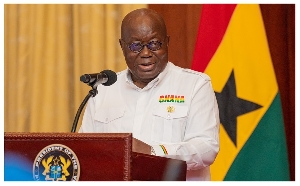Opinions of Wednesday, 3 December 2014
Columnist: The Socialist Forum
The crisis of corruption in Ghana
The Socialist Forum of Ghana (SFG) has noted that over the last few months the middle class and especially right wing establishment that dominates the corporate media has made political corruption a central issue. This is not difficult given the truly shocking revelations concerning GYEEDA, NSS, SADA, Auditor-General's reports, Judgement Debts and Black Stars' Commissions of Enquiry. Pro-NPP forces seek to convince the public that not only are all our woes the result of political corruption but further that there has been a sudden surge in corrupt practices under the current national leadership. Pro-NDC forces are fighting back with their own allegations of sordid conduct by their opponents when they were last in power. Generally, the public is increasingly disgusted with our middle class and our public leadership.
Corruption is an important issue that working people and all those struggling for a more just and productive society must pay attention to. The truth is that the scandals that have surfaced in the media represent only the tip of the iceberg. A proper investigation into state management of public resources would lead to massive civil unrest. Workers and the marginalised in society must struggle to understand this phenomenon scientifically in order to end corruption and all other forms of exploitation decisively and to build the just, productive and free society we want.
Corruption is the abuse of a public power or privilege for personal gain. Corruption is by definition a perversion of the privileged – those who have power. It is not just a moral aberration. In Ghana, corruption is an organic and integral part of the neo-colonial state whose sole agenda is to facilitate the exploitation of our labour and resources by transnational capital. Corruption is a time-honoured method through which members of the middle classes attempt to ascend into the ruling capitalist class. Of course, as socio-political conditions deteriorate and as the conduct of the elite becomes more and more apparent the practice spread down so that even the lower echelons of the bureaucracy are immersed in corruption. From a social perspective however the entire bureaucracy still represents a tiny minority in society. For the most part the capitalist class tolerates, encourages and drives official corruption as a means of lowering the cost to them of social exploitation. However, as exploitation intensifies and the masses become restless big business leaders, donor agencies, international NGOs and other agents of transnational capitalism quickly mount hypocritical high moral horses and seek to claim leadership of the fight against corruption.
Corruption's true victims are the working poor who depend on public services to maintain the most basic standards of living. The absence of social housing, the poor state of public health and education services the massive, destruction of our youth through unemployment, and the growing depravity of our society evident in increasing incidents of child abuse can all be at least partially traced to corruption in so far as it diverts vital resources from economically and socially beneficial projects. Again, as the level of intensity of exploitation grows larger sections of the middle class find their living standards threatened and questioning practices that have founded their class privilege.
The loud indignant moralization about political corruption obscures the problem and its roots. In reducing corruption to either a "moral" or "partisan" issue these forces are consciously or unconsciously engaged in diversionary tactics. They are diverting working peoples' focus away from the exploitation and repression of the working poor by the capitalist class. They are channeling working peoples' righteous anger at our increasingly brutal living circumstances against their middle class rivals for power. The truth is that all Ghana's political parties represent the same class interests. All of them in office promote the same policies and programmes and conduct themselves in the exact same disrespectful and corrupt manner. And when it comes to opportunities to enrich themselves as individuals they are absolutely united.
SFG supports the calls for greater transparency and accountability. We demand that State institutions and political leadership go beyond the charade that currently takes place around corruption. We demand the establishment of the Financial Tribunal to deal with issues arising out of the deliberations of the Public Accounts Committee of Parliament.
Ultimately however, SFG believes that nothing short of a full-blown attack on privilege and elitism and the neo-colonial political system that sustains them can uproot corruption and restore integrity to public life. This requires that working people organise to defend their interests. Working people must abandon their allegiance to pro-capitalist parties and build their own political parties to fight for a society that protects and promotes working class interests. In the end only a truly democratic, decentralized and egalitarian society can fight corruption in all its manifestations.
Entertainment












